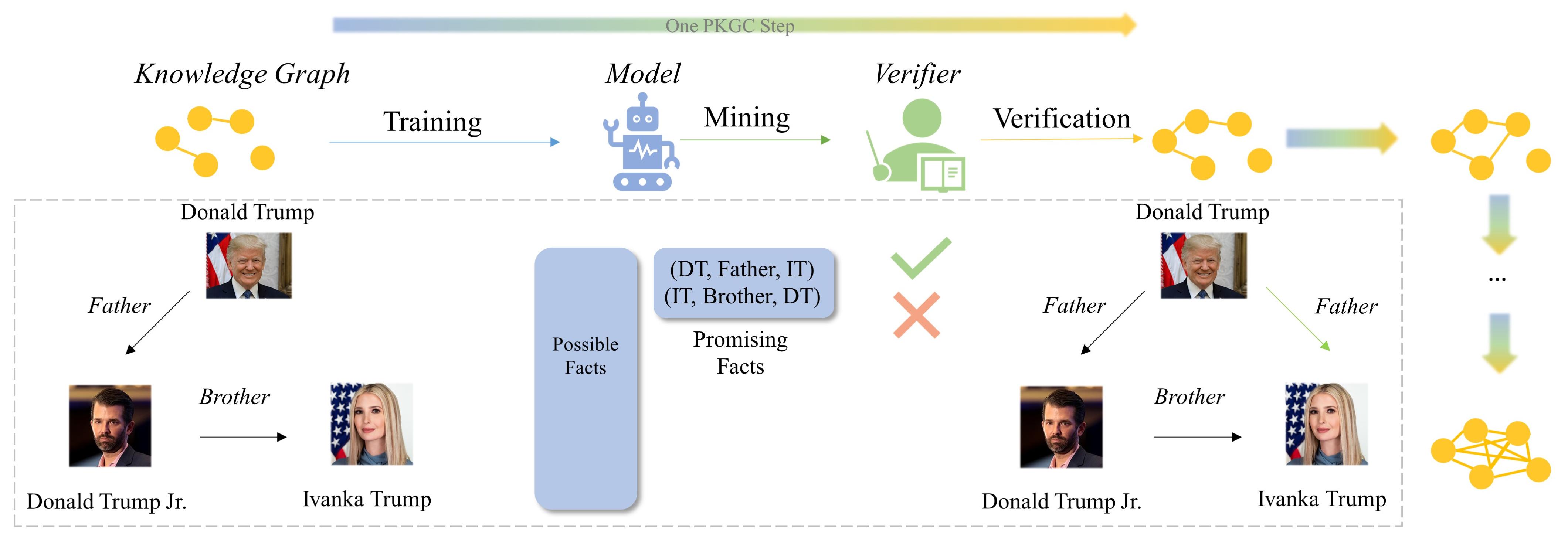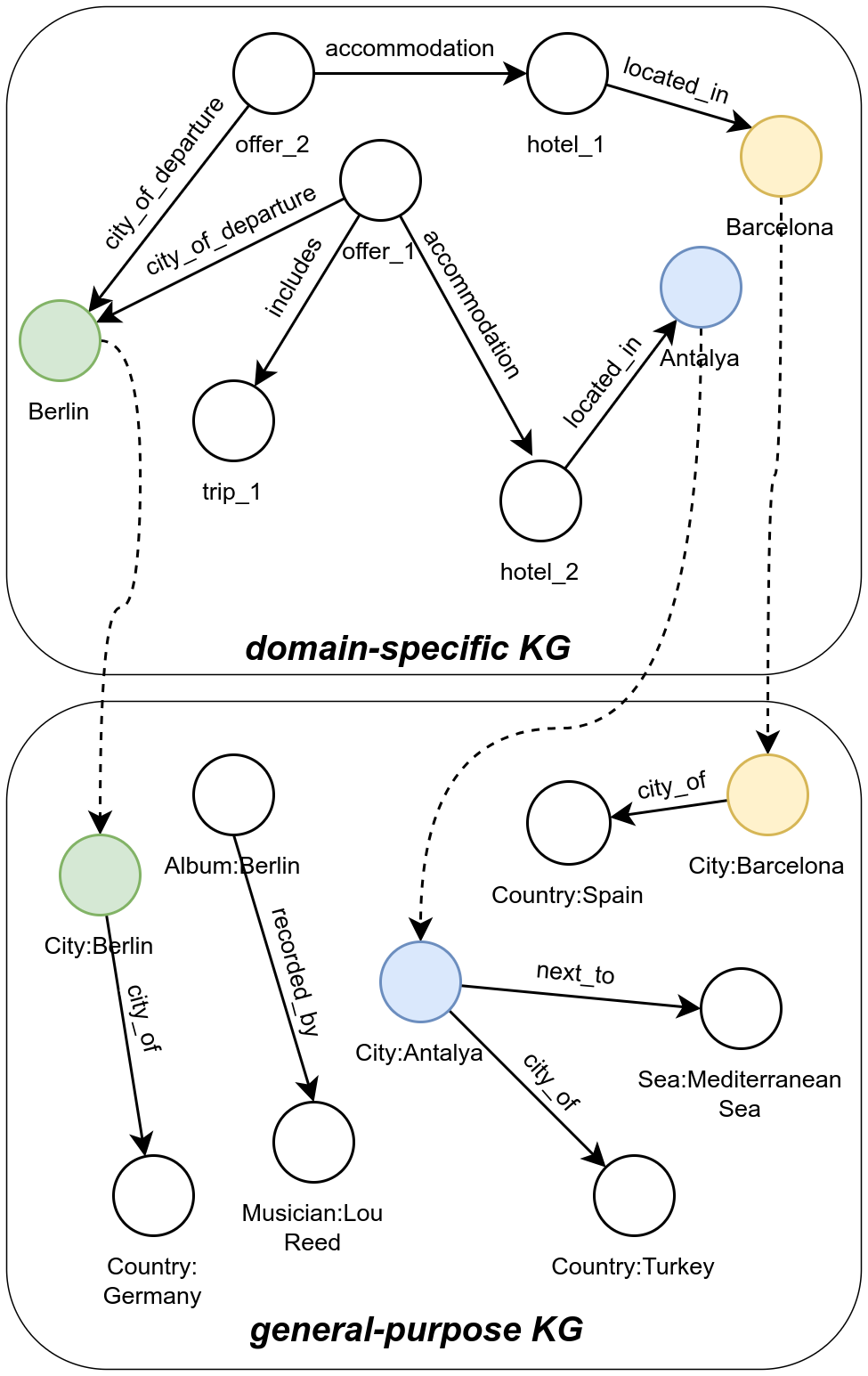Multi-level Shared Knowledge Guided Learning for Knowledge Graph Completion
2405.06696

0
0

Abstract
In the task of Knowledge Graph Completion (KGC), the existing datasets and their inherent subtasks carry a wealth of shared knowledge that can be utilized to enhance the representation of knowledge triplets and overall performance. However, no current studies specifically address the shared knowledge within KGC. To bridge this gap, we introduce a multi-level Shared Knowledge Guided learning method (SKG) that operates at both the dataset and task levels. On the dataset level, SKG-KGC broadens the original dataset by identifying shared features within entity sets via text summarization. On the task level, for the three typical KGC subtasks - head entity prediction, relation prediction, and tail entity prediction - we present an innovative multi-task learning architecture with dynamically adjusted loss weights. This approach allows the model to focus on more challenging and underperforming tasks, effectively mitigating the imbalance of knowledge sharing among subtasks. Experimental results demonstrate that SKG-KGC outperforms existing text-based methods significantly on three well-known datasets, with the most notable improvement on WN18RR.
Create account to get full access
Overview
- This paper proposes a novel approach for knowledge graph completion called "Multi-level Shared Knowledge Guided Learning" (MSKGL).
- MSKGL leverages shared knowledge across different types of entities and relations to improve the performance of knowledge graph completion tasks.
- The authors demonstrate the effectiveness of MSKGL on several benchmark datasets, showing improvements over state-of-the-art methods.
Plain English Explanation
Knowledge graphs are digital representations of real-world information, where entities (like people, places, or things) are connected by relationships (like "lives in" or "works at"). Knowledge graph completion is the task of predicting new connections in the graph based on the existing information.
The key innovation of this paper is the idea of "shared knowledge" - the authors noticed that different types of entities and relationships often have some common underlying patterns or features. For example, the information about a person's job and location might be helpful for predicting their hobbies or interests.
MSKGL aims to capture and leverage this shared knowledge across the knowledge graph to improve the model's ability to make new predictions. The authors develop a multi-level architecture that learns representations at different levels of granularity, allowing the model to encode both the specific details of each entity/relation and the broader shared patterns.
By incorporating this shared knowledge, MSKGL is able to outperform other state-of-the-art knowledge graph completion methods on several benchmark datasets. This suggests that exploiting shared patterns across the knowledge graph can be a powerful approach for improving the completeness and accuracy of these representations.
Technical Explanation
The core of the MSKGL model is a multi-level encoder that learns representations at different levels of granularity. The lower levels capture the specific details of each entity and relation, while the higher levels learn to capture the shared patterns and features across the knowledge graph.
The authors use a multi-task learning framework, where the model is trained to not only predict missing links in the knowledge graph, but also to reconstruct the input entities and relations. This auxiliary task helps the model learn more informative representations that capture the shared knowledge.
Additionally, MSKGL incorporates a gating mechanism that dynamically weights the contributions of the different representation levels based on the specific input. This allows the model to flexibly leverage the most relevant information for each prediction task.
The authors evaluate MSKGL on several standard knowledge graph completion benchmarks, including WN18RR, FB15k-237, and NELL-995. The results show that MSKGL outperforms previous state-of-the-art methods, demonstrating the value of the multi-level shared knowledge approach.
Critical Analysis
The authors provide a thorough evaluation of MSKGL, including comparisons to a variety of baselines and ablation studies to understand the contributions of different components. However, the paper does not discuss any potential limitations or caveats of the proposed approach.
One area that could be explored further is the interpretability of the learned representations. While the multi-level architecture is designed to capture shared knowledge, it is not clear how this knowledge is encoded or what specific patterns the model is learning. Providing more insights into the internal workings of MSKGL could help researchers better understand the strengths and weaknesses of the approach.
Additionally, the paper only evaluates MSKGL on standard knowledge graph completion benchmarks. It would be interesting to see how the method performs on more complex, real-world knowledge graphs or in downstream applications like question answering or recommendation systems.
Conclusion
This paper presents a novel approach for knowledge graph completion that leverages shared knowledge across different types of entities and relations. The proposed MSKGL model demonstrates strong performance on several benchmark datasets, suggesting that exploiting these shared patterns can be a powerful technique for improving the completeness and accuracy of knowledge graphs.
While the paper provides a thorough technical evaluation, further research is needed to better understand the internal workings of MSKGL and explore its broader applicability. Overall, this work represents an important contribution to the field of knowledge graph completion and highlights the value of incorporating shared knowledge into machine learning models.
This summary was produced with help from an AI and may contain inaccuracies - check out the links to read the original source documents!
Related Papers

Progressive Knowledge Graph Completion
Jiayi Li, Ruilin Luo, Jiaqi Sun, Jing Xiao, Yujiu Yang

0
0
Knowledge Graph Completion (KGC) has emerged as a promising solution to address the issue of incompleteness within Knowledge Graphs (KGs). Traditional KGC research primarily centers on triple classification and link prediction. Nevertheless, we contend that these tasks do not align well with real-world scenarios and merely serve as surrogate benchmarks. In this paper, we investigate three crucial processes relevant to real-world construction scenarios: (a) the verification process, which arises from the necessity and limitations of human verifiers; (b) the mining process, which identifies the most promising candidates for verification; and (c) the training process, which harnesses verified data for subsequent utilization; in order to achieve a transition toward more realistic challenges. By integrating these three processes, we introduce the Progressive Knowledge Graph Completion (PKGC) task, which simulates the gradual completion of KGs in real-world scenarios. Furthermore, to expedite PKGC processing, we propose two acceleration modules: Optimized Top-$k$ algorithm and Semantic Validity Filter. These modules significantly enhance the efficiency of the mining procedure. Our experiments demonstrate that performance in link prediction does not accurately reflect performance in PKGC. A more in-depth analysis reveals the key factors influencing the results and provides potential directions for future research.
4/16/2024

Multilingual Knowledge Graph Completion from Pretrained Language Models with Knowledge Constraints
Ran Song, Shizhu He, Shengxiang Gao, Li Cai, Kang Liu, Zhengtao Yu, Jun Zhao

0
0
Multilingual Knowledge Graph Completion (mKGC) aim at solving queries like (h, r, ?) in different languages by reasoning a tail entity t thus improving multilingual knowledge graphs. Previous studies leverage multilingual pretrained language models (PLMs) and the generative paradigm to achieve mKGC. Although multilingual pretrained language models contain extensive knowledge of different languages, its pretraining tasks cannot be directly aligned with the mKGC tasks. Moreover, the majority of KGs and PLMs currently available exhibit a pronounced English-centric bias. This makes it difficult for mKGC to achieve good results, particularly in the context of low-resource languages. To overcome previous problems, this paper introduces global and local knowledge constraints for mKGC. The former is used to constrain the reasoning of answer entities, while the latter is used to enhance the representation of query contexts. The proposed method makes the pretrained model better adapt to the mKGC task. Experimental results on public datasets demonstrate that our method outperforms the previous SOTA on Hits@1 and Hits@10 by an average of 12.32% and 16.03%, which indicates that our proposed method has significant enhancement on mKGC.
6/27/2024
💬
Enhancing Text-based Knowledge Graph Completion with Zero-Shot Large Language Models: A Focus on Semantic Enhancement
Rui Yang, Jiahao Zhu, Jianping Man, Li Fang, Yi Zhou

0
0
The design and development of text-based knowledge graph completion (KGC) methods leveraging textual entity descriptions are at the forefront of research. These methods involve advanced optimization techniques such as soft prompts and contrastive learning to enhance KGC models. The effectiveness of text-based methods largely hinges on the quality and richness of the training data. Large language models (LLMs) can utilize straightforward prompts to alter text data, thereby enabling data augmentation for KGC. Nevertheless, LLMs typically demand substantial computational resources. To address these issues, we introduce a framework termed constrained prompts for KGC (CP-KGC). This CP-KGC framework designs prompts that adapt to different datasets to enhance semantic richness. Additionally, CP-KGC employs a context constraint strategy to effectively identify polysemous entities within KGC datasets. Through extensive experimentation, we have verified the effectiveness of this framework. Even after quantization, the LLM (Qwen-7B-Chat-int4) still enhances the performance of text-based KGC methods footnote{Code and datasets are available at href{https://github.com/sjlmg/CP-KGC}{https://github.com/sjlmg/CP-KGC}}. This study extends the performance limits of existing models and promotes further integration of KGC with LLMs.
6/28/2024

Empowering Small-Scale Knowledge Graphs: A Strategy of Leveraging General-Purpose Knowledge Graphs for Enriched Embeddings
Albert Sawczyn, Jakub Binkowski, Piotr Bielak, Tomasz Kajdanowicz

0
0
Knowledge-intensive tasks pose a significant challenge for Machine Learning (ML) techniques. Commonly adopted methods, such as Large Language Models (LLMs), often exhibit limitations when applied to such tasks. Nevertheless, there have been notable endeavours to mitigate these challenges, with a significant emphasis on augmenting LLMs through Knowledge Graphs (KGs). While KGs provide many advantages for representing knowledge, their development costs can deter extensive research and applications. Addressing this limitation, we introduce a framework for enriching embeddings of small-scale domain-specific Knowledge Graphs with well-established general-purpose KGs. Adopting our method, a modest domain-specific KG can benefit from a performance boost in downstream tasks when linked to a substantial general-purpose KG. Experimental evaluations demonstrate a notable enhancement, with up to a 44% increase observed in the Hits@10 metric. This relatively unexplored research direction can catalyze more frequent incorporation of KGs in knowledge-intensive tasks, resulting in more robust, reliable ML implementations, which hallucinates less than prevalent LLM solutions. Keywords: knowledge graph, knowledge graph completion, entity alignment, representation learning, machine learning
5/20/2024